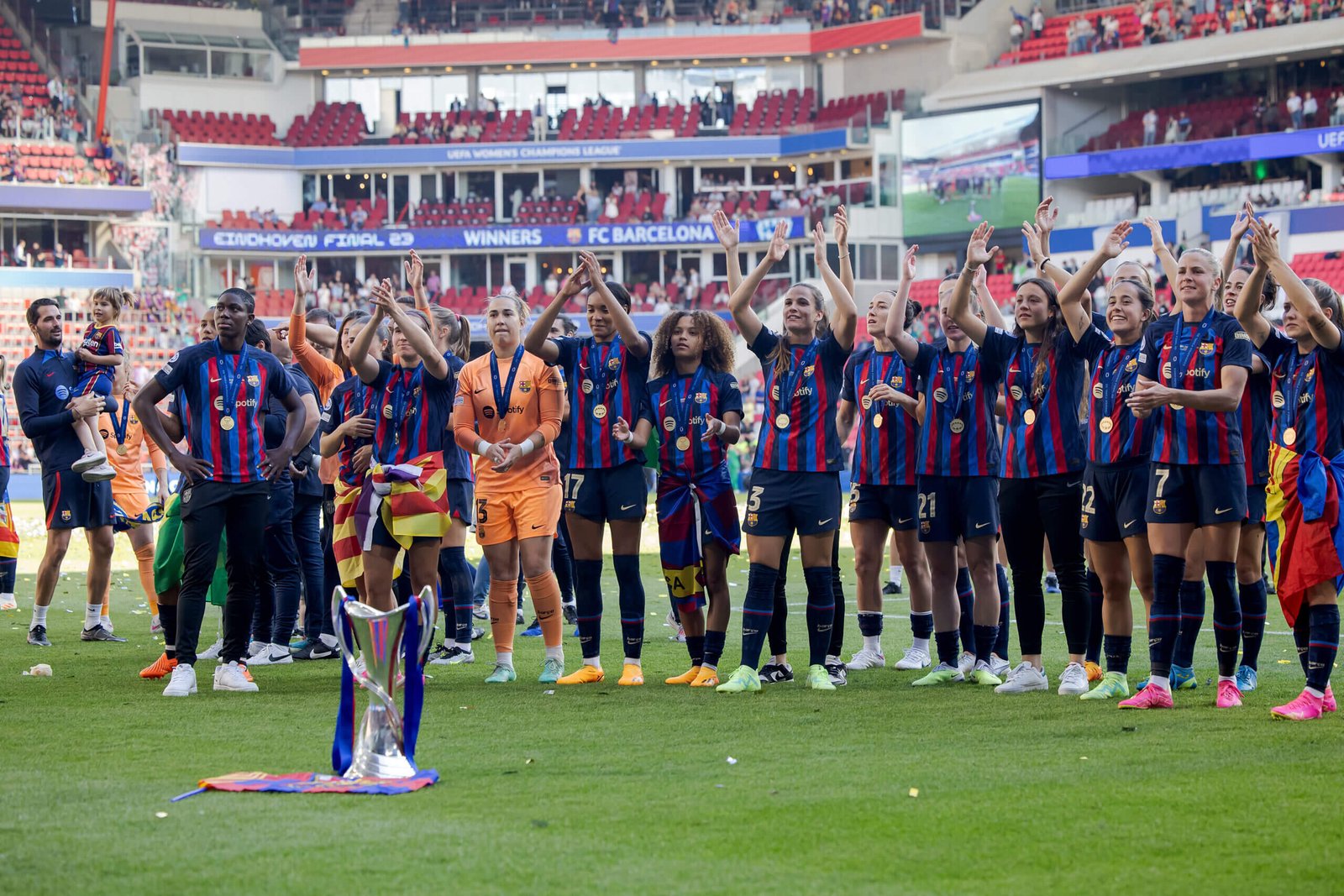At the Estadi Olimpic Lluis Companys on Saturday, there was a sense of bewilderment.
Something had happened that Barcelona Femeni are not used to: they had lost at home, in the first leg of their Women’s Champions League semi-final against English visitors Chelsea.
“How do you feel about having done what nobody has been able to do for five years?” Chelsea manager Emma Hayes was asked by a local journalist to start her post-match press conference.
Barca’s women had not suffered a home defeat since February 2019 (a 3-2 in a Spanish top-flight match against Sporting Huelva) and the previous time they had failed to score in a home game was in March 2018 — 1-0 to France’s Lyon in the second leg of a Champions League quarter-final.
That said, calling it a ‘home game’ is slightly misleading as Saturday’s match was their first at the Lluis Companys, where the Barcelona men’s team are playing their home games while the Camp Nou is extensively refurbished — the women’s side usually play their home matches at the 6,000-capacity Estadi Johan Cruyff, which is part of the club’s training complex.
Hayes has faced 19 teams in the Champions League across her eight years at Chelsea and Barcelona, who won last year’s final, had been the only one she had not beaten. The win gives her side a slender advantage for the second leg at Stamford Bridge this Saturday evening but, at 1-0, the tie is still open.
Barcelona will take many lessons from that first leg.
Barca were frustrated by Chelsea (Joan Valls/Urbanandsport/NurPhoto via Getty Images)
Last week, Barca’s star midfielder Aitana Bonmati publicly complained about their lack of competition in Spain’s Liga F and praised the Women’s Super League, its English equivalent. It became clear what the reigning Ballon d’Or winner meant as the game against Chelsea unfolded.
Hayes reacted superbly to the positioning of forwards Salma Paralluelo and Mariona Caldentey, closing them down with five defenders and nullifying Barca’s attacking play. It was as if Jonatan Giraldez’s team were up against a brick wall.
In recent years, this all-conquering Barca side have not been used to being put under pressure. They regularly thrash opponents in domestic fixtures and the gap between them and their rivals — even Real Madrid — is significant.
But it has sometimes been a different story in the Champions League.
This week, their former winger Lieke Martens told Catalan newspaper Ara that Barcelona partly lost the competition’s 2022 final against Lyon because of overconfidence.
Martens, now of Lyon’s domestic rivals and opponents in the Champions League’s other semi-final Paris Saint-Germain, had been convinced they would win. The players even sung with fans from their hotel balcony in Turin before the final as if they had already won.
🔥LA GRAN CONJURA
🏩🎵Les jugadores del @FCBfemeni saluden i canten amb l’afició desplaçada a l’hotel de Torí#ChampionsTV3 #UWCLfinal
📲https://t.co/wVSOClmlOh pic.twitter.com/fXhgowWWd3
— Esport3 (@esport3) May 21, 2022
The result was a bitter pill for Barcelona to swallow: a 3-1 defeat, in which they were outclassed, conceding all three goals in the opening 33 minutes.
Since then, they have focused on becoming mentally stronger — coaches wanted to create a side who would not fall apart when games became complicated and could come from behind to win any match.
The staff, who not only conduct extensive analyses of Barcelona’s opponents but are also aware of their own team’s weaknesses, decided to do this through staging full-sided games in training — as they realised that Barca players would put more pressure on their team-mates than most other sides.
That work helped lead them back to the Champions League final last season, where they came from two goals down against Wolfsburg of Germany to win 3-2.

Barcelona produced a fine comeback to win last year’s Champions League final (Rico Brouwer/Soccrates/Getty Images)
That was a significant step forward, but coaches continue to work on the team’s psychological strength. On Wednesday they were pushed hard in a Liga F match against third-from-bottom Levante Las Planas, falling 2-1 behind in 19 minutes before rallying to win 4-2.
They will need those qualities again in west London this weekend.
“On a mental level, we have worked a lot over the years; we are a stronger team in that aspect,” Giraldez said after the first leg. “I have full confidence that we will go there to win the game — something we are used to doing.
“When you need to go for the game, sometimes you rush the attacks. The important part of this is that, on an emotional level, the game plan continued until the final whistle.”
Even if they have one of the best squads in Europe, Barcelona will need to put less emphasis on individual talent when the second leg begins.
Last season, they beat Chelsea 2-1 on aggregate in the semi-finals thanks to an inspired performance from Caroline Graham Hansen, who is having one of her best seasons. Hayes’ team took note and cancelled out the Norwegian’s threat in the first leg by sticking tight to her, ensuring she could not connect with Barca’s midfielders.
The hosts looked to Paralluelo instead, who became their reference point in attack. But the Spain international was erratic, slow to control the ball and could not score — although she came the closest of any Barcelona player.
Chelsea focused on closing down their hosts and hitting them on the counter — something Giraldez had warned would be the case but could not prevent from happening. The WSL side wasted time in the final minutes to preserve their lead — Bonmati called their style of play “dirty” — but it worked in closing out the win.
“If the referee allows them to get on the ground and waste time, we must learn to play like that too,” Bonmati told Catalan TV station TV3.
And Giraldez also acknowledged his players would have to be wise to Chelsea’s tactics at Stamford Bridge.
“They were very good defensively,” Giraldez said. “When you lose against an opponent like that, it is partly credit to them and partly credit to us. Their plan worked very well and we will have to change things for the second leg.”
As the players left the dressing room post-match with disgruntled looks on their faces, the fans who had come to the Lluis Companys for the first time to see them chanted, “Si, se puede” — ‘Yes, we can.’
Only time will tell if that is the case.
(Top photo: Pau Barrena/AFP via Getty Images)
Read the full article here


